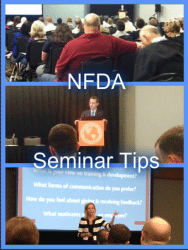Oct 23, 2014
Every year, funeral professionals fill the NFDA Convention seminar rooms to hear experts and leaders discuss the latest advances and ideas shaping our profession. Last week, directors had an opportunity to learn about everything from funeral marketing tips, to forensic anthropology to building relationships with hospice workers. The 2014 convention also offered several new and interesting classes on fresh topics like green burials and social media.
Communicating effectively with families and employees is crucial to the work and success of funeral professionals. As a company dedicated to helping directors enhance their communications, ASD is always interested in seminars that focus on this subject. Three classes immediately caught our eye when we received the NFDA Convention Workshop schedule:
Transparency and Social Media: Creating an Ethical Edge for Your Firm
Presented by Caleb Wilde, sixth-generation Funeral Director at Wilde Funeral Home, Parkesburg, PA and author of the Confessions of a Funeral Director blog
Panel Presentation: The Benefits of Diversity for Your Business
Moderator: Edward J. Defort, NFDA. Presented by John C. Carmon, CFSP, Carmon Community Funeral Homes, Avon, CT; Stephen R. Kemp, CFSP, Haley Funeral Directors, Southfield, MI; Steve Trevino, Ponderosa Valley Funeral Services, Parker, CO; Erin Christie Whitaker, CFSP, CPC, Whitaker Funeral Home Inc., Newberry, SC
“Talkin’ ’Bout My Generation”: Four Generations in the Funeral Home
Presented by Lacy Robinson, CFSP, Aurora Casket Company, Aurora, IN
If you weren’t able to go to the show or couldn’t attend these workshops, we will share some of the ideas presented to help funeral homes communicate more effectively with their community and staff.
1. Embrace Transparency
Caleb Wilde is no stranger to many in the funeral profession who read his popular and refreshingly honest blog, Confessions of a Funeral Director. He is also no stranger to those who live in his community because of his personal philosophy on remaining approachable to the public. Caleb recalled how during his childhood approachable meant that his grandfather would sit on the front porch every night allowing anyone who had a question or concern to stop by and talk to him any time.
Today, technology has made this type of interaction less common, but funeral directors can use social media to rebuild these relationships and recharge those conversations. With more than 74% of the population now using Facebook (including 49% of those over the age of 65), there is an expectation from the public that businesses should be open and in the space for conversation. Caleb explained how embracing transparency on Facebook, blogs and other social media helps to humanize funeral directors in the public eye.
“When you sit on the front porch of social media, people will respect you because that is the new ethic,” Caleb explained.
2. Research Your Community’s Demographics
During the thought-provoking panel on the benefits of diversity for funeral homes, Moderator, Ed Defort, began the session by talking about how demographics can shift dramatically over time. He then opened the discussion up to Funeral Director, John Carmon, who discussed how his community had changed from a predominantly Irish-Catholic population to a diverse community that included those of Jewish, Hindu, Muslim and Buddhist faiths.
Funeral Directors Stephen Kemp, Steve Trevino and Erin Whittaker echoed this, describing the population shifts in their own community. Erin pointed out that diversity could also apply to economical differences as well between people in urban and rural communities. They all recommended that funeral homes invest in research to determine the demographics in their own area in order to serve those distinct groups. Prearrangment conferences also offer an opportunity to learn in advance about a different culture or religion.
“Don’t wait until you get that first call,” Erin warned. “Do research in advance and plan so that you can serve their unique needs.”
3. Recognize Generational Differences
Lacy Robinson’s enlightening NFDA panel began with a helpful fact: “This is the first time in American history when four generations are working together,” she stated. Lacy went on to identify the four major generational groups and their unique characteristics. These included Traditionalists (born between 1922-1943), Baby Boomers (born between 1944-1964), Generation Xers (born between 1965-1981) and Millennials (1982-1999).
Lacy explained that the best way to recognize generational differences in your own staff is to ask several essential questions when evaluating employees. These include:
- How do you believe decisions should be made?
- What forms of communication do you prefer?
- How do you like to be rewarded?
By asking these questions, funeral home owners will understand what motivates their staff and will be better prepared to handle any conflicts that may arise.
4. Take Back Control of the Conversation
Funeral directors are often portrayed harshly by the media and entertainment industries. For every positive story about a funeral home, there are a dozen others about a director who stepped out of line in some way. In his session, Caleb discussed this public perception and how funeral professionals can combat it by engaging in meaningful conversations about death and dying on social media. Sharing experiences, answering questions and posting photos online helps to break down that barrier between the public and the funeral home. By sitting on the sidelines, directors are missing an opportunity to offer their unique point of view.
“We’re privy to a perspective that few people are able to see,” Caleb said. “But we have not taken the steps to join in and so we’re allowing others to control the conversation.”
5. Learn about Different Religious and Ethnic Customs
In order to remain both competitive and service-hearted, funeral directors must take time to understand and appreciate the funeral traditions of other cultures and religions. This fact was reiterated multiple times by the NFDA’s panel on diversity. All four funeral directors described the success they found by catering to emerging ethnic and religious groups in their area and respecting those differences. Taking extra steps to honor these families’ requests will show that your funeral home can be trusted to handle their specific needs.
“We need to embrace our changing communities and listen to them because they are loyal if you serve them well,” said Funeral Director, Steven Kemp. “If you don’t understand, accept and value what they do, they won’t come to you.”
6. Leverage the Strengths of Each Generation Working In The Funeral Home
Rather than try to change the behaviors of employees who are from different generations, funeral home owners should recognize the skills and unique perspective that each employee offers. Lacy recommended asking three questions to leverage the strengths of every employee on staff:
- What can that employee do better than anyone else?
- How does that employee contribute to making a family’s experience memorable?
- What can I learn from that employee?
These questions can help funeral home owners identify and harness the specific talents each generation brings to the table.
7. Find Interesting Stories to Share
“Our own perspective is only so big, so I’m always looking for someone with a story to share.” Caleb offered this advice when asked a question about finding content for a blog. For directors invested in growing their online presence, the use of guest bloggers can drive up engagement and build relationships. Use your funeral home’s website, newsletter or social sites to inform families and followers that you are accepting submissions for guest posts on your site. According to Caleb, personal stories resonate the most with readers. Consider sponsoring an essay contest on a funeral-related topic or reaching out to clergy and other leaders in the community about tackling a subject on your blog.
8. Build Relationships with Leaders in Diverse Communities
Funeral directors should take time out of their schedule to attend services at churches, temples, mosques and other religious institutions that are different from their own. This advice was reiterated several times during the Diversity panel at NFDA. When you establish a relationship with clergy and cultural leaders in the community, these dignitaries will know they can come to your funeral to serve the specific needs of their members. The panel also recommended sponsoring ads in different church bulletins or offering a scholarship to let these diverse groups know that you are there to serve them.
9. Identify Points of Friction At Their Core
Several potential conflicts are likely to arise when different generations work together in a funeral home. Lacy identified several of these such as decision-making, dress code and feedback. She explained how funeral home owners and managers can settle these issues by examining the generational dynamics at play. For instance, traditionalists and baby boomers grew up during a time when performance reviews were much more formal. When feedback meetings are scheduled in advance and documented thoroughly, they are likely to feel more comfortable in this setting. On the other hand, Generation Xers and Millenials crave feedback and expect to receive it with little formality. They are used to discussing their performance on a regular basis and like to know how their work is being received. By recognizing what approach works best for each generation, funeral home owners and managers can resolve points of friction and help everyone to work together harmoniously.
10. Raise the Ethnical Expectations of Your Community
Have you ever received a call from a family who needs to have their loved one moved from another funeral home in the area due to unethical business practices? While most funeral directors are caring, honest individuals, a few bad apples have tarnished society’s perception of the profession. Caleb explained how social media provides funeral directors with an opportunity to showcase what makes their firms’ facilities, employees and business practices different. Your community will come to expect that level of openness. Online feedback and reviews build credibility for ethical firms while exposing the corruption of disreputable businesses.
“If we make transparency an industry standard, honest funeral directors can disclose themselves from the inside out and bad funeral homes won’t be able to stay in business,” Caleb explained.
11. Offer Diversity Training to Staff
The NFDA Diversity Panel ended with an important discussion of staff diversity training. All four directors agreed that every employee hired should be trained to understand the different religious and ethnic groups the funeral home serves. Respect and understanding of different cultures, traditions and customs is an essential characteristic all employees must share.
“There is no room for racial jokes in that environment,” said Funeral Director, John Carmon. “From your most experienced director to the kid outside parking cars, you have to make sure that all the people on your staff have the same perspective.”
12. Become A Mentor
Towards the end of her session, Lacy shared a story about her first job at a funeral home. She was coached by a Baby Boomer director who watched her interacting with guests during funeral services and noticed Lacy had a natural gift. To leverage Lacy’s strengths, the director asked her to perform a weekly Lawrence Welk concert senior citizens in the area could attend. This provided an excellent opportunity for the funeral home to engage with the public that was centered around the unique talents that Lacy brought to the table. By taking the time to mentor Lacy, this director was able to cultivate valuable skills in her employee that benefited both the funeral home and community.
What were your favorite sessions and speakers at the NFDA Convention? Leave a comment below and share with us what tips you picked up at Nashville this year.
About The Author
Jess Farren (Fowler)
Jess Farren (Fowler) is a Public Relations Specialist and Staff Writer who has been a part of the ASD team since 2003. Jess manages ASD’s company blog and has been published in several funeral trade magazines. She has written articles on a variety of subjects including communication, business planning, technology, marketing and funeral trends. You can contact Jess directly at Jess@myASD.com


